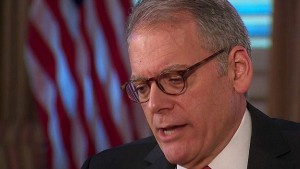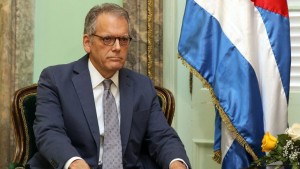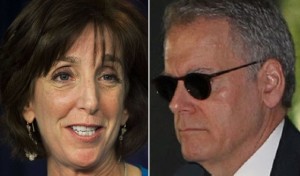STATEMENTS FROM THE U.S. AMBASSADOR IN HAVANA.
Ambassador Acting US in Cuba, Jeffrey DeLaurentis, said Monday that the visit of Barack Obama to the island is a strong signal of the new relationship between the two countries and called for “further expansion” relief measures embargo aimed at facilitating the exchange and trade ties.
“We will be a strong signal of change in the relationship between the US and Cuba and between the Cuban and American people. We see it as an opportunity to further expand areas that will benefit the Cubans themselves,” said DeLaurentis in an interview with Efe at his residence in Havana on Obama’s visit, between 20 and 22 March.
To the ambassador, the visit of the US president is the “next step” in the list of historical events of the last fifteen months: the announcement of the restoration of diplomatic relations of 17 December 2014; the formal opening of embassies in July 2015 and the visit of Secretary of State John Kerry to Havana to raise the flag, last August 14.
DeLaurentis said that the purpose of the US is “keep working” to strengthen “trade links” that have been woven since the January 20, 2015 entered into force the first changes in regulation eased some restrictions of the embargo and they have stoked the interest of many US companies for the island.
“We are still looking for ways to expand the impact of these measures and to connect them with the changes that are taking place in Cuba,” DeLaurentis, who encouraged Congress to accelerate discussions on the embargo, in line with the majority opinion said Americans, whose support for conCuba approach has been gaining momentum over the past year.
However, it did not confirm rumors that point to approval in the days before or during Obama’s visit to Cuba of a new package of measures to relax the embargo as the possibility that the prohibition on the island of using the dollar rises in their international transactions.
Since announcing the restoration of relations of December 17, 2014, President Obama has resorted to four times its executive powers to ease the embargo, with provisions that have facilitated the travel of Americans to the island, the inflow of remittances and imports of certain goods.
DeLaurentis explained that many of these measures “focused directly” to support the emerging private sector is making headway in Cuba, known on the island as “self-employed”, hovering and half a million and are one of the pillars on which Raul Castro’s reforms settle to update the socialist model of the island.
“We see now that 25% of the workforce in Cuba corresponds and the private sector, which continue to grow. It is an important for the economy to continue to progress and the Government recognizes its usefulness engine,” said DeLaurentis, the US diplomat rank on the island and technically he holds the post of business manager, because the US has not yet appointed ambassador.
In addition to lifting the embargo, the differences between the two countries on human rights is one of the stumbling blocks in the normalization of relations, a matter that “remains a priority” for the US, he said.
“We remain concerned about the situation of human rights and President Obama will pronounce on the matter during his visit and meet with members of the independent civil society,” said DeLaurentis on the planned meeting with dissidents, who are reporting an increase in repression against activists.
“We remain concerned about the situation of human rights and President Obama will pronounce on the matter during his visit.” However, he admitted that there have been “some improvements” on the island, such as the release of 53 political prisoners at the request of the US or increasing connectivity by installing wifi in public areas.
To further strengthen the ties between the two countries, DeLaurentis stressed the importance of contacts between the two peoples – “there is interest and enthusiasm on both sides” – that will have a decisive role in future developments. “We believe that is the best way to advocate here for values and principles we defend elsewhere,” he said.
Needless formal conversion of the former Interests Section -created in 1977- in an embassy last July 20, said he has allowed them to get involved and make contact with the Government and the Cuban people for a more “complete and comprehensive” mode.
“We are now creating a network of contacts to reach agreements in a way that two countries just 90 miles away should exchange and cooperation,” he said.
The ambassador added that without this new more solid and stable communication would have been impossible to achieve agreements such as the restoration of commercial flights or direct mail, or engage in a dialogue on human rights.
Agencies / EFE / Sara Gómez Armas, Havana / Internet Photos / Extracts.
THE CUBAN HISTORY / HOLLYWOOD.
Arnoldo Varona, Editor.
DECLARACIONES DEL EMBAJADOR DE EEUU EN LA HABANA.
El embajador en funciones de EE UU en Cuba, Jeffrey DeLaurentis, afirmó este lunes que la visita de Barack Obama a la Isla es una señal firme de la nueva relación entre los dos países y abogó por “seguir expandiendo” las medidas de alivio del embargo que buscan facilitar el intercambio y lazos comerciales.
“Para nosotros será una señal firme del cambio de relación entre EE UU y Cuba y entre el pueblo cubano y estadounidense. Lo vemos como una oportunidad de seguir ampliando espacios que van en beneficio de los propios cubanos”, destacó DeLaurentis en una entrevista con Efe en su residencia en La Habana sobre la visita de Obama, entre el 20 y 22 de marzo.
Para el embajador, la visita del mandatario estadounidense es el “siguiente paso” en la lista de acontecimientos históricos de los últimos quince meses: el anuncio del restablecimiento de relaciones diplomáticas del 17 de diciembre de 2014; la apertura formal de embajadas en julio de 2015 y la visita del secretario de Estado John Kerry a La Habana para izar la bandera, el pasado 14 de agosto.
DeLaurentis señaló que el propósito de EE UU es “seguir trabajando” para intensificar los “vínculos comerciales” que se han ido tejiendo, desde que el 20 de enero de 2015 entraran en vigor las primeros cambios de regulación que aliviaban algunas restricciones del embargo y que han avivado el interés de numerosas compañías estadounidenses por la Isla.
“Seguimos buscando maneras de ampliar el impacto de esas medidas y de conectarlas con los cambios que se están produciendo en Cuba”, señaló DeLaurentis, quien animó al Congreso a acelerar los debates sobre el fin del embargo, en sintonía con la opinión de la mayoría de los estadounidenses, cuyo apoyo al acercamiento conCuba ha ido cobrando fuerza en el último año.
No obstante, no confirmó los rumores que apuntan a la aprobación en los días previos o durante la visita de Obama a Cuba de un nuevo paquete de medidas para relajar el embargo como la posibilidad de que se levante la prohibición a la isla del uso del dólar en sus transacciones internacionales.
Desde el anuncio del restablecimiento de relaciones del 17 de diciembre de 2014, el presidente Obama ha recurrido hasta en cuatro ocasiones a sus facultades ejecutivas para aliviar el embargo, con disposiciones que han facilitado los viajes de estadounidenses a la isla, la entrada de remesas y las importaciones de ciertos bienes.
DeLaurentis explicó que muchas de esas medidas “se centraron directamente” en apoyar al incipiente sector privado que se abre camino en Cuba, conocidos en la isla como “cuentapropistas”, que rondan ya el medio millón y que son uno de los pilares sobre los que se asientan las reformas de Raúl Castro para actualizar el modelo socialista de la Isla.
“Vemos ahora que el 25% de la fuerza laboral en Cuba corresponde ya al sector privado, que seguirá creciendo. Es un motor importante para que la economía siga progresando y el Gobierno reconoce su utilidad”, subrayó DeLaurentis, el diplomático estadounidense de más rango en la isla y que técnicamente ocupa el puesto de encargado de negocios, porque EE UU aún no ha nombrado embajador.
Además del levantamiento del embargo, las diferencias entre ambos países sobre derechos humanos es otro de los escollos en la normalización de relaciones, asunto que “sigue siendo una prioridad fundamental” para EE UU, indicó.
“Seguimos preocupados por la situación de los derechos humanos y el presidente Obama se va a pronunciar al respecto durante su visita y se reunirá con miembros de la sociedad civil independiente”, precisó DeLaurentis sobre ese encuentro previsto con disidentes, que están denunciando un aumento de la represión contra activistas.
“Seguimos preocupados por la situación de los derechos humanos y el presidente Obama se va a pronunciar al respecto durante su visita”. No obstante, admitió que se han producido “algunas mejoras” en la isla, como la liberación de 53 presos políticos a petición de EE UU o el aumento de la conectividad con la instalación de zonas públicas wifi.
Para seguir estrechando los lazos entre los dos países, DeLaurentis destacó la importancia de los contactos entre los dos pueblos -“hay interés y entusiasmo en los dos lados”-, que tendrán un papel determinante en los progresos futuros. “Creemos ésa es la mejor manera de abogar aquí por valores y principios que defendemos en otros lugares”, dijo.
Sobra la conversión formal de la antigua Sección de Intereses -creada en 1977- en una embajada el pasado 20 de julio, indicó que les ha permitido implicarse y entablar contacto con el Gobierno y el pueblo cubano de un modo más “completo y abarcador”.
“Estamos creando ahora una red de contactos para alcanzar acuerdos de una manera que dos países a tan solo 90 millas de distancia deberían intercambiar y cooperar”, apuntó.
El embajador matizó que sin esa nueva comunicación más sólida y estable hubiera sido imposible lograr acuerdos como el restablecimiento de los vuelos comerciales o el correo postal directo, o entablar un diálogo sobre derechos humanos.
Agencies/EFE/Sara Gómez Armas, La Habana/Internet Photos/Extractos.
THE CUBAN HISTORY/ HOLLYWOOD.
Arnoldo Varona, Editor.






